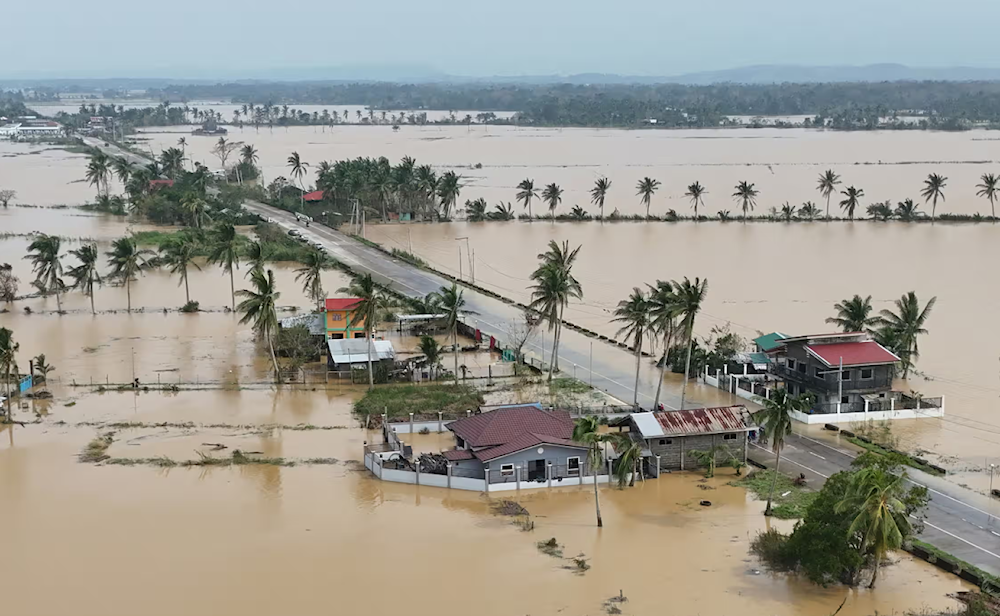Super Typhoon Man-yi rocks the Philippines
Waves up to 14 meters (46 feet) high pounded the Catanduanes coast, while Manila and other susceptible coastal areas faced storm surges of more than three meters during the next 48 hours
-

Flooded houses and rice fields in Buguey town, Cagayan province, Philippines. (Undated, AFP)
Super Typhoon Man-yi hit the Philippines on Saturday, triggering warnings of "catastrophic" effects as massive waves battered the coast. Over 650,000 people evacuated as it became the sixth severe storm to strike the country in a month.
At least 163 people have died in the five recent storms that hit the Philippines, displacing thousands and destroying crops. Climate change is worsening storms, with heavier rainfall, flash floods, and stronger winds. The country faces around 20 major storms annually, but it's rare for so many to strike in such a short time.
Man-yi made landfall as a super typhoon on the thinly populated island province of Catanduanes, bringing maximum wind speeds of 195 km (121 mi) per hour and gusts of 325 km per hour, according to the weather agency. Forecasters predicted a "catastrophic and life-threatening situation" as the typhoon hit.
Waves up to 14 meters (46 feet) high pounded the Catanduanes coast, while Manila and other susceptible coastal areas faced storm surges of more than three meters during the next 48 hours, according to weather forecasters.
No reported casualties yet
Catanduanes lost power ahead of the storm, forcing shelters and the command center to rely on generators for power. while Catanduanes and northern Camarines Sur provinces saw "extreme threats to life and property."
Catanduanes provincial disaster operations chief Roberto Monterola told AFP that despite no reported casualties yet, things could be heard breaking and falling while at evacuation centers.
Man-yi may strike Luzon, the country's most populated island as a super typhoon or typhoon on Sunday afternoon, moving north of Manila and coasting into the South China Sea on Monday. On Saturday, the authorities encouraged citizens to heed warnings and escape to safety.
"If preemptive evacuation is required, let us do so and not wait for the hour of peril before evacuating or seeking help, because if we did that we will be putting in danger not only our lives but also those of our rescuers," Interior Undersecretary Marlo Iringan said.
In Northern Samar province, disaster officer Rei Josiah Echano remarked that storm destruction was the fundamental cause of the region's poverty. "Whenever there's a typhoon like this, it brings us back to the medieval era, we go (back) to square one," Echano told AFP.
The mayor of Naga City in Camarines Sur province ordered a curfew at noon on Saturday in an attempt to keep people indoors. All vessels, including fishing boats and oil tankers, were instructed to remain in port or return to land.
The volcanology service warned that Man-yi's heavy rains could trigger lahars from three volcanoes, including Taal, south of Manila. The typhoon hit late in the season, with cyclones typically forming from July to October. This month, four storms formed simultaneously in the Pacific for the first time in November since 1951.
People 'paying terrible price' for climate inaction: Guterres
UN Secretary-General Antonio Guterres raised the alarm again in October about global warming, saying that humanity is already "paying a terrible price" for failing to act on the matter.
The UN Environment Programme (UNEP) issued a new study last month citing all-time high greenhouse gas emissions documented in the UN Emissions Gap study 2024, asking world leaders to take immediate action to avert catastrophic rises in temperatures and avoid the worst impacts of climate change.
Guterres stated in a recorded statement during the publication of the UNEP's Emissions Gap report that the emissions gap is not an abstract concept, emphasizing that "there is a direct link between increasing emissions and increasingly frequent and intense climate disasters," asserting that the report clearly showed "there can be no more playing for time. We are out of time."
"Around the world, people are paying a terrible price," he stated, detailing how these emissions mean record temperatures that fuel "monster hurricanes," and "biblical floods."
He cautioned that "Record heat is turning forests into tinderboxes," likening the situation to walking a tightrope.
"Either leader bridge the emissions gap or we plunge headlong into climate disaster, with the poorest and most vulnerable suffering the most," Guterres said, describing that there was still hope if the world's leading economies take the lead in efforts to reduce greenhouse gas emissions.
"Today's report shows affordable, existing technologies can achieve the emissions reductions we need to 2030 and 2035 to meet the 1.5°C limit, but only with a surge in ambition and support," he explained.

 5 Min Read
5 Min Read









